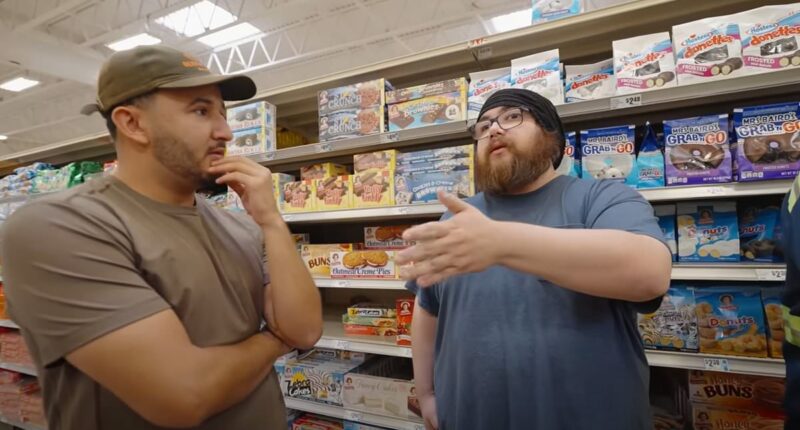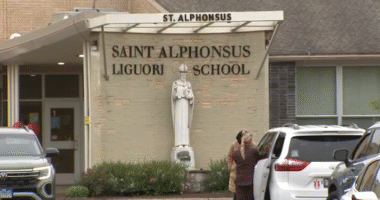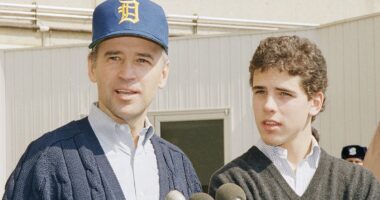This small, little-known Texas town has a big problem.
McAllen is the most obese town in America, with an astonishing nearly eight in 10 adults either obese or overweight.
It also has the second-highest share of obese teenagers out of all the cities in the US and the second-most obese children.
As a result, there has been an explosion of diabetes, heart disease and weight-related cancers in recent years.
Now, a revealing documentary sheds light on the epidemic that has taken hold of a border town, exposing the manipulative marketing strategies employed by junk food producers to lure residents into a cycle of self-destruction.
In one scene, filmmakers from the YouTube channel Yes Theory, sit down with McAllen resident Alejandra, who used to be 270lbs.
‘By the age of 28… my organs were starting to malfunction and they [the doctors] gave me about five good years and then after that they wouldn’t know how things would go for me.’
Like many McAllen locals, Alejandra – who does not provide her last name – grew up in Mexico just 10 miles away.

An eye-opening documentary delves inside America’s fattest city, with residents revealing what health-hitting issues they face

Ammar Kandil and Staffan Taylor, of the YouTube channel Yes Theory, ventured into McAllen, Texas, a city that has earned the unfortunate title of being the most obese in the nation on multiple occasions.
She reveals that she started piling on weight as a child after gorging on unhealthy school meals such as pizza, chicken, nuggets and burgers.
As a child in her home country, Alejandra said she grew up on her mother and grandmother’s cooking and ‘never got any processed food’.
But in the US, as she was forced to eat the free school meals, her addiction to fast food grew.
She said: ‘From first grade to fifth grade I ballooned up in weight.’
Alejandra doesn’t reveal how she managed to reduce her weight but in the documentary, she appears in better health.
When quizzed about why obesity is so high in McAllen, Alejandra says it is largely down it being a high poverty community, with fast food being the most affordable way to satisfy hunger pangs.
In 2024, the poverty rate in McAllen, which has a population of around 146,000 and is located along the southeastern part of the Rio Grande Valley, was just under 21 percent, which is around double the national average.
Alejandra reveals that at the end of every month, when people are ‘running out of cash’, all of the fast food outlets in McAllen advertise bargain deals with ‘wings for 25 cents on Wednesdays [or] tacos for 50 cents on Tuesdays’.
At an iHop pancake restaurant the Yes Theory team stop at, they see a sign promoting free meals for kids during happy hour.

A report issued last year revealed that more than 8 out of 10 people in the pint-sized metropolis are obese or overweight, with diabetes and heart disease rife

At an iHop pancake restaurant the Yes Theory team stop at, they see a sign promoting free meals for kids during happy hour
Venting his outrage at this, filmmaker Ammar says: ‘That is so sick. I’m thinking about how manipulative this is. [If] you’re a dad or you’re a mom and you don’t have that much [money] to support your family, of course you’re going to come here.
‘This is evil that you’re you’re using people’s circumstances to just grab a family and have them come spend money here.’
Around 45 percent of adults over 18 in McAllen are obese, compared to 40 percent nationally, and an additional 31 percent of McAllen residents are overweight.
That puts the share of adults who are too fat at 76 percent.
As they drive through the city, Ammar says in one area, he counts six fast food restaurants in a two block radius.

Many McAllen locals grew up in Mexico, as the country border is just 10 miles away

After exploring McAllen, the filmmakers say that they believe the problem regarding fast food isn’t just specific to the city and it is an issue plaguing the country
Like Alejandra, other McAllen residents say the ease of fast food is a big problem.
One woman the Yes Theory team speak to in a grocery store says it is difficult to escape drive-thrus in the city but she attempts to cook more at home for the sake of her children.
A man who is also wandering the aisles explains that buying goods at the grocery store isn’t much better than fast food as so many products in the US are ultra processed.
While pointing to a box of Cheerios in the cereal aisle he explains: ‘You put a little heart on [the box] people are just assuming it’s healthy and that’s not really the case because the moment you put some sugar on it or anything frosted… it’s not healthy, it doesn’t matter.
‘[Even] if you get regular Cheerios… they’re still putting all that sugar into your body.’
One and a half cups of Original Cheerios has 2g of sugar, while the same serving size of Honey Nut flavor has 18g.

In one scene, the filmmakers sit down with McAllen resident Alejandra, who reveals that she started piling on weight after gorging on unhealthy free meals at school

As they drive through the city, the Yes Theory team count six fast food restaurants in a two block radius
The man in the film, who is not named, says that buying healthier products also costs more, so many McAllen residents ‘are restricted by price tags’.
He adds: ‘When you’re living paycheck to paycheck getting stuff that is healthier isn’t feasible sometimes.’
One McAllen resident who is armed with more knowledge around diet is medical student Surya Namboodiri.
But she tells the Yes Theory team that her awareness isn’t through school and it is something she has had to educate herself on.

Buying goods at the grocery store isn’t much better than fast food as so many products in the US are ultra processed
!['You put a little heart on [the box], people are just assuming it's healthy,' one McAllen resident says of some breakfast cereals](https://i.dailymail.co.uk/1s/2025/01/17/17/94217561-14293327-_You_put_a_little_heart_on_the_box_people_are_just_assuming_it_s-a-22_1737133757303.jpg)
‘You put a little heart on [the box], people are just assuming it’s healthy,’ one McAllen resident says of some breakfast cereals
She reveals: ‘Nutrition is basically not in our curriculum at all. Maybe we get one to two hours throughout our entire four years of medical education.’
It is this lack of education, Ms Namboodiri says, which is fueling obesity in McAllen.
She adds: ‘It’s unfair to just point at the people and be like “why are you not doing this, why are you letting these bad habits control your lives?”‘
‘It’s not just their personal choice in the matter, you have to also look at the infrastructure [and] the lack of access to these healthier food options.
‘We’re also not doing our part and educating people as to what even an unhealthy diet looks like. If I just say “oh you need to eat healthier” they don’t know what that looks like. They just know what they’ve been growing up eating.’

One man in the film, who is not named, says that buying healthier products also costs more, so many McAllen residents ‘are restricted by price tags’.

A box of corn dogs at the grocery store is advertised as a good source of protein
After exploring McAllen, the filmmakers say that they believe the problem regarding fast food isn’t just specific to the city and it is an issue plaguing the country.
Ammar concludes: ‘When we first had the idea to investigate McAllen, we went with a thought that there was something unique about this town.
‘But after speaking to the residents and dissecting the issue with experts, we slowly grew more aware that this isn’t a McAllen problem, it’s an American problem, one that has seeped into every city across the country.
‘But what we also learned from this experience is that for those out there struggling with weight issues there is hope.
‘By learning about the systems that are in place and educating ourselves on how we can improve our diet and well-being we can break the unhealthy cycle that we seem to be stuck in and take back control of our quality of living.’

















